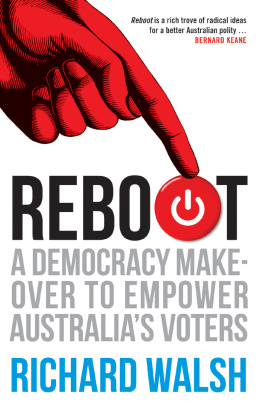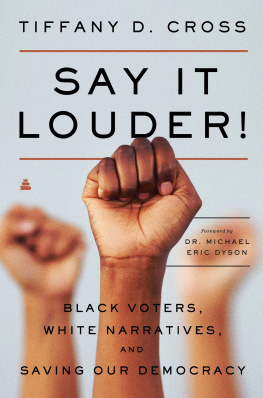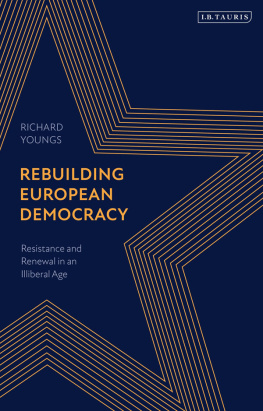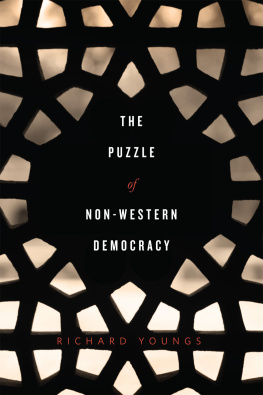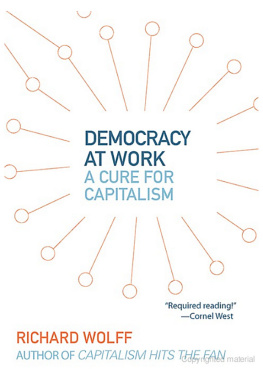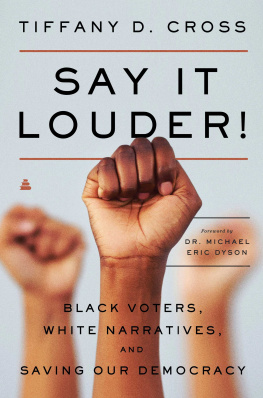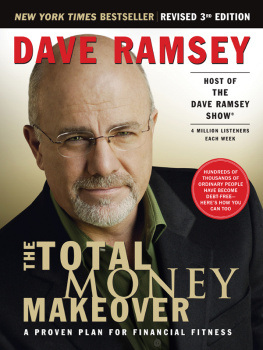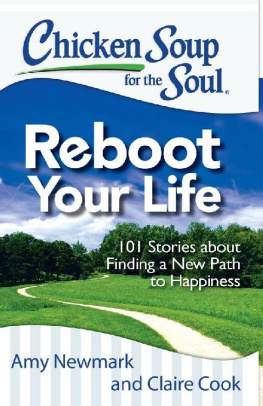MELBOURNE UNIVERSITY PRESS
An imprint of Melbourne University Publishing Limited
715 Swanston Street, Carlton, Victoria 3053, Australia
www.mup.com.au
First published 2017
Text Richard Walsh, 2017
Design and typography Melbourne University Publishing Limited, 2017
This book is copyright. Apart from any use permitted under the Copyright Act 1968 and subsequent amendments, no part may be reproduced, stored in a retrieval system or transmitted by any means or process whatsoever without the prior written permission of the publishers.
Every attempt has been made to locate the copyright holders for material quoted in this book. Any person or organisation that may have been overlooked or misattributed may contact the publisher.
Cover design by Philip Campbell Design
Typeset by Megan Ellis
Printed in Australia by McPhersons Printing Group
National Library of Australia Cataloguing-in-Publication entry
Walsh, Richard, author.
Reboot: a democracy makeover to empower Australias voters/
Richard Walsh.
9780522872156 (paperback)
9780522872163 (ebook)
Includes index.
DemocracyAustralia21st century.
PoliticiansAustralia21st century.
AustraliaPolitics and government.
1
THIS IS TRULY RIDICULOUS
IT IS A COMMONPLACE to say that most Australians today, like most citizens in other Western democracies, are disillusioned with their politicians. Few voters identify with any political party; few people feel an urge to belong to any of the main political parties; most believe that the decisions reached by parliaments and political leaders ultimately reflect the narrow interests of those elites that currently finance the two major political partiesthe trade unions and big business. But no one seems to be actively looking for a solution to this malaise.
The truth is, the system we presently operate under is ill conceived. Its weaknesses and internal contradictions are more obvious to us now than ever before.
In a true democracy the federal parliament needs only one house, and that house should represent accurately the will of the electors. But these days in any election for the Australian House of Representatives each seat ultimately, after the inevitable culling of sundry optimists, represents a battle between two main contenders, sometimes three. None of them accurately reflects the totality of any individual electors views. Basically we are forced to vote for the imperfect candidate who is kinda close to what we believe inthe one who is just that bit closer than the other, slightly more imperfect candidate.
Is this a recipe for voter satisfaction? When we go to the supermarket, we are typically faced with a mind-numbingly nuanced range of choices within our favourite household brandsgone are the days when Henry Ford magisterially pronounced we could have any colour, so long as it was black. So why are we being forced to make such a limited choice in such an important area of decision-making? Why is there a wider choice among the kinds of milk we can purchase than among the candidates who have a real chance of being elected?
How members of parliament vote on legislation is full of contradictions. The theory is that they should vote according to the wishes of those in their electorate, but the practice is that they fall in behind their partys policies. When that policy is clearly at odds with what their own constituents want, they of course advocate passionately on behalf of their constituents in the privacy of the party room. Occasionally they will even make a speech in the chamber that is at odds with how they eventually vote.
There are other seductive theories about how MPs should vote. One is that they should lead public opinion, which is a genteel way of saying that they should be allowed to vote against the will of the people if they deem their electors to be ignorant fools. This is actually more fascist than democratic. No matter how informed and enlightened we may feel on a particular issueclimate change, gun control or whateverthere is a mighty obligation on us to persuade others that we are right. The modern tendency is to ignore the persuasion bit and to simply attempt a bit of moral bullying; and it is this that is causing so much of the divisiveness and disillusionment in which we now find ourselves.
And then there is democracys Get Out of Gaol Free cardthe theory that MPs can under certain circumstances follow their own conscience, rather than the wishes of their electors. This is the grossly undemocratic argument that has led us to the impasse on euthanasia and same-sex marriage, two issues on which the will of a clear majority of people is currently being thwarted.
Politics has become a debased and brutal business, totally unsuitable as a calling for anyone who possesses a skerrick of idealism. Of course there are some decent people in the federal and state parliaments, but I have no idea how they got there and remainthe stink in which they are mired is so great that they must be suffering from anosmia.
Within the two major political parties factionalism is dominant, which means that loyalty to the factional warlordsthey are mainly menis more important than anything else. Malcolm Turnbull once straight-facedly told a NSW State Liberal Conference that, unlike the Labor Party, We are not run by factions; he was then forced to grin sheepishly when some in his audience laughed out loud and he realised that every single party loyalist in that room believed he was cracking a joke. He is now so humiliated in his obeisance to the most reactionary members of his own party that, if he had a shred of pride left, he would have resigned a while ago.
In Western Australia, there was the instructive saga of the alarmingly conservative Joe Bullock, state secretary of the Shop, Distributive and Allied Employees Association (SDA, the shoppies) and a significant power broker in the ALP. He first gained preselection for a state by-election, where he proved so unattractive as a candidate that he lost a seat that should have been a gimme. He later gained the number 1 position on the Senate ticket at the 2013 elections, pushing aside a sitting senator, Louise Pratt, who happened to be left aligned. Bullock ultimately proved himself so wildly unsuitable and so utterly at odds with core Labor values that he was left with no option than to resign.
At the last elections in Tasmania, there was an equally instructive saga involving Eric Abetz, who dominates the Liberal Party in that state. As an act of petty vengeance against his Prime Minister, Abetz forced the most senior Tasmanian member in the Turnbull Government, Tourism Minister Richard Colbeck, down to the unwinnable fifth position on his partys Senate ticket. Colbeck failed to get returned, given his impossible position on the ticket, but in protest 15 per cent of Liberal voters gave him their number 1 vote. Abetzs custodianship of his party in his home state proved so astutely attuned to the electorates wishes that the Liberals at those elections lost all the seats they then held in the House of Representatives.
Not that the ALP can gloat too much over all this. Their own factional bosses in Tasmania, in the lead-up to the same election, relegated sitting Senator Lisa Singh to the seemingly unwinnable sixth position on their Senate ticket, allegedly because she was unaligned to any factionthese things always seem to befall women. However, Singh fought back hard and was re-elected, obtaining the first preference of more than 20 per cent of ALP votersan act of protest by ordinary Labor supporters that had not been seen for more than half a century.



